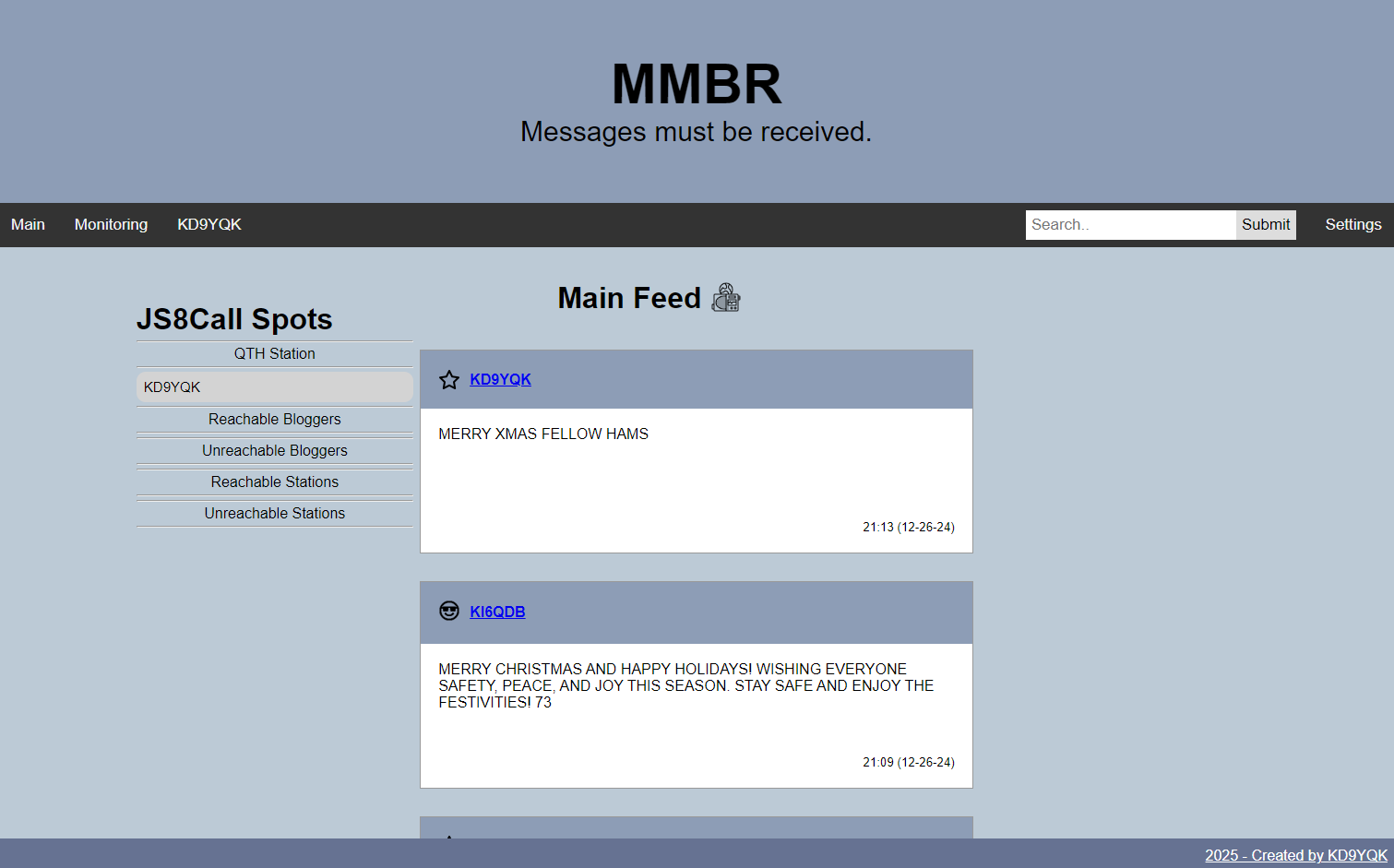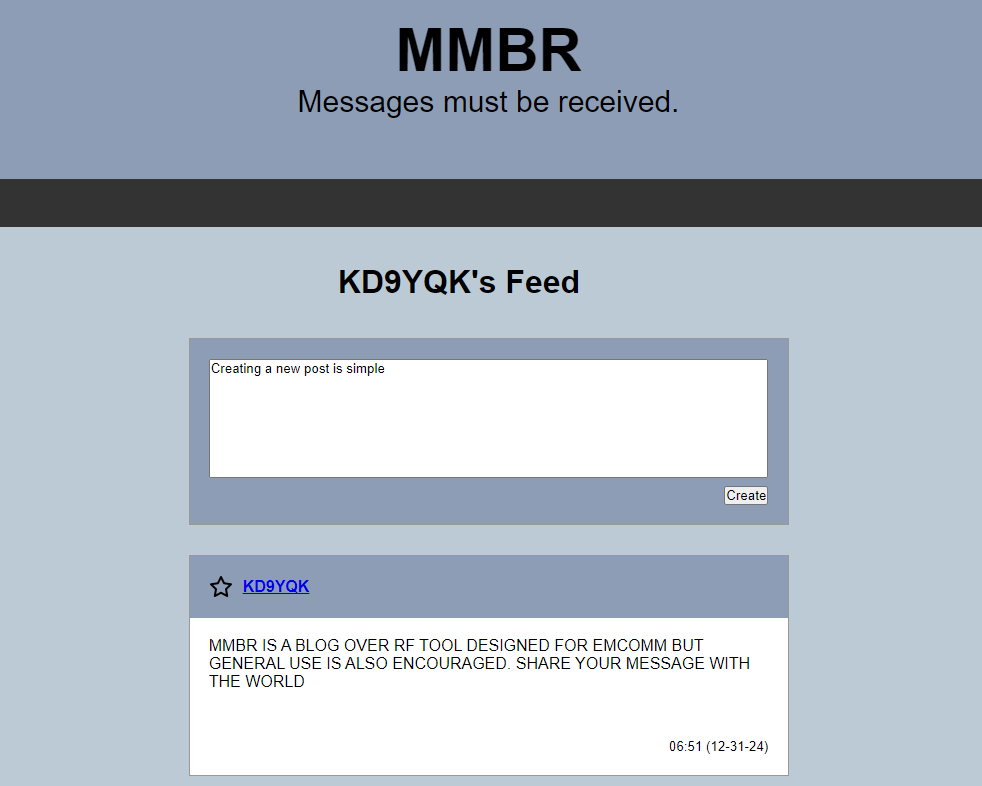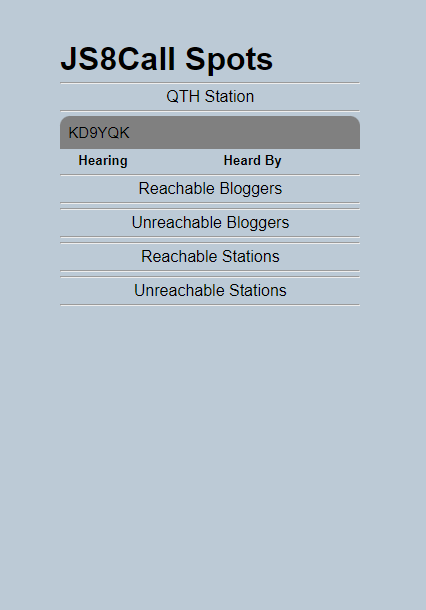MMBR - Messages Must Be Received

What is MMBR?
MMBR is an RF driven 'blog' messaging system. It is intended as a way to pass messages through a variety of radio platforms. It functions as a local database to assist other stations in passing needed information when communications may be limited or down. The original intended purpose is to assist with EMCOMM activities, but day to day use is also welcomed. The more stations who participate, the better chance an emergency message gets where it needs to go.
- Modern Web Interface
- Cross Platform
- JS8Call Interfacing
- APRS Kiss TCP Interfacing
- Command Line Interface for Packet Nodes
- TCP Client/Server Architecture
- Run in background and activates radio connections 'on-demand'
How does it work?
MMBR utilizes a local database to store the message posts that have been logged by the software, as well as the ones created by the user. MMBR interfaces via TCP/IP with JS8Call, KISS enabled TNC's running APRS like Direwolf or SoundModem, and/or an Internet Server to listen for and broadcast message posts from other clients. Any new messages heard are instantly added to the local database, and can then be later viewed on the web GUI. These posts can then be received by other MMBR clients at a later time when requested.
MMBR is intended to be ran as a background service in either a Windows or a Linux Environment (Mac Untested). It requires very little system resources and will run in 'standby' mode when no interfaces are available. When a valid interface becomes available, for instance JS8Call has been opened, MMBR will establish a connection and begin listening for valid traffic. If our previous instance of JS8Call is later closed, then MMBR will return to standby. This also applies to KISS APRS interfaces, as well as the internet server.


MMBR and JS8Call
JS8Call was the first mode implemented into MMBR, due to it's ability to pass traffic in sub-optimal conditions and decode weak signals. As such, much of the functionality of MMBR was designed around utilizing JS8Call's messaging client. Upon startup, if it doesn't exist, a new group called @BLOG will be created. This is the primary group where a majority of new posts will be received, and is also where the new posts created are sent. DO NOT DELETE THIS GROUP! It is required for MMBR to function correctly, even if a custom group is added in the settings. In order for MMBR to work as intended, and to have the best chances a message is received, all clients must be able to send and receive to/from that group.
JS8Call has a variety of ways for MMBR to collect new message posts from other clients. A blanked broadcast to the @BLOG group will prompt all other clients that are online to transmit and return their last created post. Also, if a particular station's post is desired, a blanket message can be sent asking listening clients to respond with the last post they have heard from that station if one is in their local database.
Additional functionality for directed queries can also be accomplished by using the custom web panel which is visible when JS8Call is enabled. It categorizes and displays all station spots that have been recently heard, and can be used to ask individual known MMBR clients directly for their posts, with the intent of mitigating band traffic.
MMBR and APRS
APRS functionality is also available in MMBR, through the use of the KISS protocol standard. MMBR can connect as a client to programs such as Direwolf and Soundmodem via TCP/IP to allow for transmitting newly created posts, as well as receiving targeted posts through the APRSIS gateway from other APRS stations.
How about packet?
A simple command line client for MMBR has also been added, which can be used within packet nodes to allow for a text based interface. Packet clients can create their own posts, as well as lookup other posts from other callsigns. The command line tool can also be used by group admins to create posts on behalf of their group, which can be used as a sort of bulletin.
TCP/IP Server Database
MMBR can also access a special TCP/IP server over the web. Whenever a post is heard over RF from another station, or a new post is created, these can be relayed through the internet to all other connected clients. This allows stations without internet access to be picked up by internet-enabled stations which can then also assist in he distribution of the message.